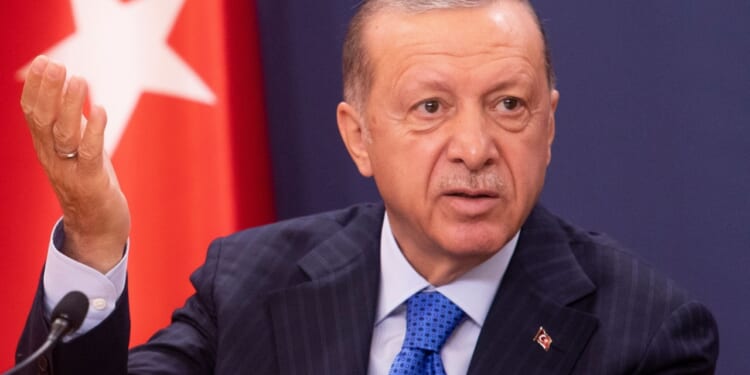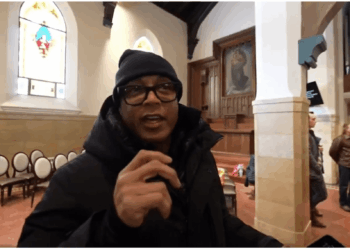Ankara’s pro-Hamas rhetoric makes it unfit to help police the Gaza Strip.
Turkish president Recep Tayyip Erdogan seeks to co-broker the Gaza peace process for his own prestige, to Hamas’s benefit, and at Israel’s expense.
Since the first stage of the Gaza Peace Plan went into effect on October 10, Erdogan has launched his plans to carve out a place for Ankara in the process. Between pushing Hamas to agree to US president Donald Trump’s “20-Point Plan” and deploying cleanup crews to the Gaza Strip, Erdogan envisions Turkey side-by-side with the United States at the head of the mediation game. For the Turkish president, it is not a matter of good intentions or moral example—it’s part of his quest to cement Ankara’s status as a regional Islamic power.
Turkey was the first Muslim-majority state to establish formal relations with Israel in 1949. But Erdogan has made it his personal mission to disparage the Jewish state and praise terrorists who murder Israeli and Gazan civilians alike as “the resistance.”
And yet his government now reaps praise from all corners of the earth, from the Hamas leadership to the United States. One need not look far to find that this fanfare is certainly undue.
Erdogan’s “Special Relationship” With Hamas
The glaring problem with Erdogan’s dream of making Turkey a regional peace guarantor is his unflinching sympathy for and sponsorship of Hamas. Turkey does not consider Hamas a terrorist group and, if anything, sits on the bleachers with Iran and Qatar in sponsoring the organization’s activities.
Turkey’s Foreign Minister Hakan Fidan and National Intelligence Director Ibrahim Kalin flew all the way to Doha to chat with Hamas’s top brass, known as the Shura Council, on October 21. But lest we forget, they’ve got Hamas at home. The United States sanctioned several key Hamas militant leaders and financiers living in Turkey last November. These unsavory figures include Abd al-Rahman Ghanimat, a top organizer for Hamas’s West Bank units, and money launderer and convicted murderer Musa Daud Muhammad Akari.
Erdogan himself has a long and close relationship with Hamas’s leadership, a “familiarity” he proudly touts. In 2006, the terror group’s erstwhile Political Bureau chief, Khaled Mashal, happily accepted Erdogan’s invitation to visit Turkey. There is a fine line between criticism of the Israeli government’s policies and espousing terrorist sympathies and hatred towards all of Israel. Since the October 7 attacks, Erdogan has not even attempted to toe that line. Within weeks of Hamas’s massacre of 1,200 civilians in southern Israel—which he never condemned—Erdogan openly praised the terror group, stylizing them as “liberators.”
Ankara’s Shoe-In Strategy in Gaza
For all of Erdogan’s hypocritical moralizing, preventing further loss of life is low on the Ankara government’s list of priorities. In fact, Turkey gaining a foothold in Gaza, be it diplomatic or even military, serves as a regional power play reminiscent of neo-Ottomanism.
At this point, Turkey has worked to establish a ground presence and a diplomatic stake in Gaza after taking up the mantle of the “Hamas Whisperer.” The Turkish Humanitarian Relief Foundation (IHH), an organization with links to the Muslim Brotherhood, began cleanup operations in Gaza on October 18. And ahead of proposals to establish an International Stabilization Force (ISF) to keep the peace in Gaza, Ankara has expressed interest in sending troops to the Strip.
Since meeting with Trump at the White House on September 25, Erdogan appears to have rekindled his interest in exploiting ties with Washington for his own gain. Trump has since continued to express satisfaction with Erdogan, referring to him as a “gentleman” and a “reliable ally.” Keeping relations warm with the United States keeps Erdogan’s foot in the door of the Gaza process and gives him room to push for his long-sought-after F-35 deal.
So what does Erdogan want in Gaza, if not simply the betterment of all mankind? Simply put, he and his cronies want another satellite in which to place troops and political capital, all to become the Middle East’s Sunni Islamist power. Fidan pointed to this in a recent interview with pro-government Turkish media, claiming that Turkey is preparing to become Gaza’s security “guarantor” as it is for Northern Cyprus. Crossing the Turkish military occupation in Cyprus with Erdogan’s vitriol against Israel spells trouble for hopes of keeping Hamas down and out.
The realistic extent to which Erdogan can pursue his ambition of a Turkish quasi-protectorate in Gaza is dubious. Israeli prime minister Benjamin Netanyahu strongly hinted at his vehement objection to any Turkish force presence, even among the ISF. This should be little surprise given Erdogan’s attitude towards the Jewish state. Yet,\ in the diplomatic arena, Ankara continues to gain traction.
Turkey Must Disown Hamas if it Wants Lasting Peace
Erdogan must remember that Hamas is a terrorist organization, not a legitimate representative of Gazan civilians. Washington should remember this as Erdogan continues to push his way into the peace process, and as Hamas executes political opponents in the streets of Gaza.
Israeli officials distrust Erdogan on account of his Hamas-philic tendencies, and that should give Washington pause, too. The United States should condition Turkey’s role in the Gaza peace process on two trust-building measures. First, Erdogan must arrest or expel all Hamas operatives in Turkey—the group deserves no leverage or haven in Ankara. Second, the Turkish government should immediately designate Hamas as a foreign terrorist organization. The Gaza peace process ought to be in the hands of policymakers who know and condemn terrorism when they see it.
Nevertheless, the United States should not advocate for Turkey as a security guarantor in the proposed ISF. The presence of armed Turkish forces in Gaza increases the likelihood of weapons and cash flowing into Hamas’s arms once more. Even Turkish aid organizations, given their ideological inclinations, ought to be subject to international supervision.
Erdogan’s bargaining chip is that he can talk to Hamas, and they will listen. But that is, after all, the kind of leverage seen in friends of terrorists.
About the Authors: Sinan Ciddi and William Doran
Sinan Ciddi is a Senior Fellow on Turkey at the Foundation for Defense of Democracies (FDD) in Washington, DC.
William Doran is a student at Georgetown University Walsh School of Foreign Service and a research intern at the Turkey Program at the Foundation for the Defense of Democracies.
Image: Sasa Dzambic Photography / Shutterstock.com.


















